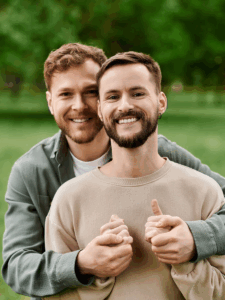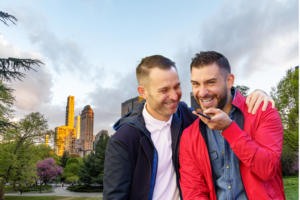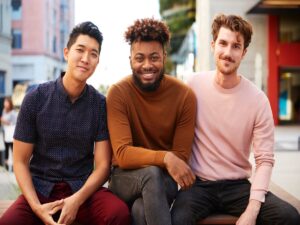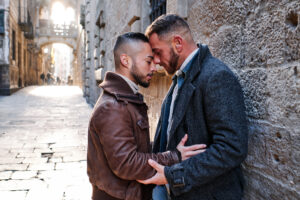You’re scrolling through Instagram at 2 AM again, watching your ex post stories from Fire Island while you’re alone in your studio apartment near Union Square. Sound familiar?
Meanwhile, maybe you’re the couple having the same argument about PDA on the subway for the third time this month. Or perhaps you’re that power couple everyone envies on the outside. However, behind closed doors, you’re struggling to maintain real emotional intimacy between demanding careers and the endless pressure of gay life in New York City.
Key Takeaways: Advice for Gay Relationships
• The best advice for gay relationships in NYC: Build trust, practice open communication, and create emotional safety to thrive despite unique urban and LGBTQ+ challenges.
• Schema chemistry shapes who you’re drawn to. Recognizing these patterns helps break unhealthy cycles and deepen real connection.
• Effective gay couples therapy and community support are proven ways to overcome internalized homophobia, societal pressures, and relationship barriers.
• Online gay couples therapy with NYC specialists offers privacy, flexibility, and expert guidance tailored to your relationship’s needs.
Here’s what I’ve learned after nearly three decades as a gay couples therapist in Manhattan. I co-created the first EFT training video for same-sex couples with Sue Johnson. I also developed schema therapy for couples with Jeffrey Young. The best advice for gay relationships isn’t found in generic self-help books or straight-focused relationship guides.
Gay couples also face unique challenges that call for specific, research-driven strategies. On top of that, thriving gay relationships grow from intentional work that honors both universal relationship truths and the beautifully complex dynamics of same-sex love.

You’re navigating challenges that deserve more than cookie-cutter solutions scraped from relationships that look nothing like yours. Building intimacy in a world still catching up to your love story? That requires specific strategies rooted in how gay partnerships work. Thriving gay relationships emerge through intentional work that honors universal relationship truths while embracing what makes your partnership beautifully, uniquely complex.
My couples aren’t hunting for theoretical frameworks. They want tools that fit their actual lives.
Ready to transform your relationship from surviving to thriving? Book your online gay couples therapy session today and start building the love story you deserve.

Whether you’re newly dating someone you met at Industry Bar or you’re long-term partners contemplating marriage, gay relationships in NYC demand more than just chemistry and good intentions. Instead, they require an understanding of everything from family dynamics in Bay Ridge to the competitive dating scene in Chelsea. Moreover, building something meaningful in one of the world’s most demanding cities.
My advice comes from real relationship work with couples who’ve transformed their partnerships from surviving to thriving using proven therapeutic approaches like Emotionally Focused Therapy (EFT) and Schema Therapy.
One gay couple recently shared: “Travis helped us understand that our fights weren’t about dishes or money—they were about old schemas getting triggered. Once we learned to recognize our coping modes, everything changed. Now we actually look forward to difficult conversations because we know how to stay emotionally connected instead of getting stuck in those old patterns.”
Foundation Elements: Building Strong Gay Relationships Through Communication and Trust
The most successful gay couples I work with understand that healthy relationship advice for gay relationships starts with three fundamentals: crystal-clear communication, unshakeable trust, and deep mutual respect. However, for many gay men, these three elements also have some differences. You often build these foundations while processing years of messaging that your love isn’t valid or worthy.
Establish Open Communication Patterns That Work
Forget what you learned watching your parents’ straight relationship. Those patterns don’t translate when you’re two men navigating a romantic partnership. Moreover, most gay men weren’t raised with models of healthy same-sex communication. Consequently, this means you get to create your own rules.
The gay couples who succeed create their rituals. For example, one couple I work with in Park Slope has “Real Talk Time” every Sunday morning. During this time, they spend thirty minutes practicing vulnerability and discussing anything bothering them. Additionally, this consistent check-in prevents minor issues from becoming relationship-ending disasters.

It isn’t about talking more. Instead, it is about talking better.
When your partner says they felt uncomfortable at your company holiday party, don’t brush it off. Ask what made them feel that way. If they bring up worries about your family’s acceptance, listen and validate their feelings instead of jumping to defend your mom.
Better conversations mean hearing each other, even when it’s tough. That’s how real connection grows.
Online therapy offers the perfect safe space for these conversations. Many of my Manhattan and Brooklyn clients appreciate the privacy and comfort of discussing sensitive attachment needs from their homes without the stress of commuting to an office after a long workday. Plus, let’s be honest—sometimes it’s easier to talk about feeling emotionally starved in your relationship when you’re sitting on your couch with your emotional support cat nearby. And when that familiar urge to shut down and pull away kicks in? The comfort of your space can help you stay present instead of disappearing altogether.
Build Trust Through Radical Transparency and Secure Attachment
Trust in gay relationships often requires healing from past experiences where your identity wasn’t safe. When you’ve spent years hiding fundamental parts of yourself from family or straight friends, learning to be completely transparent with a romantic partner can feel terrifying. Nevertheless, it’s also revolutionary at the same time.
EFT research shows that secure attachment in adult relationships can heal early attachment wounds. Building trust means being consistent in both big and small moments while learning to share your emotional world safely. Show up when you say you will. Follow through on commitments. Be honest about your feelings, even when they’re complicated.
For gay men, this often includes being transparent about their comfort level with public displays of affection. Furthermore, it involves how out you are in different contexts. Additionally, it includes how you handle interactions with family members who may not be fully accepting. The goal isn’t perfection—creating a “secure base” where both partners can be vulnerable without triggering each other’s protective modes.
Practice Active Listening and Emotional Attunement
One client couple struggled because one partner was completely out while the other was still navigating complex family dynamics with conservative parents in Staten Island. In EFT terms, this created an anxious-avoidant cycle where the out partner pursued more openness while the less out partner withdrew to protect himself. In this case, respect meant not pushing the less-out partner to be more public than felt safe. Simultaneously, it meant honestly discussing how this affected their emotional connection.
Active listening goes beyond just hearing words. Instead, it means reflecting on what you’ve understood and acknowledging the emotional content of what your partner shares. In my practice, I’ve noticed that gay male friends often provide this kind of emotional support naturally. However, romantic relationships require a different level of emotional attunement that can feel vulnerable.
Validation doesn’t mean agreement. Instead, it means acknowledging that your partner’s feelings make sense from their perspective. Using EFT language, you might say: “I can see that when your parents act like I don’t exist, you feel torn between staying connected to them and staying connected to me. That must be incredibly painful.” This emotional validation can rewire the brain for more secure attachment.

Expert Advice for Gay Relationships: Navigating Unique Challenges
Gay relationships face challenges that straight couples don’t encounter. Pretending otherwise does a disservice to the relationship work required to build something lasting. Therefore, the key is addressing these challenges head-on rather than hoping they’ll resolve themselves.
Address Internalized Homophobia and Early Life Schemas
Even in progressive areas like Manhattan and Brooklyn, internalized homophobia can show up in subtle ways. It might manifest as feeling uncomfortable with public affection near your office in Midtown. Additionally, it could involve questioning whether your relationship is “real” compared to heterosexual couples. Furthermore, it may include struggling with body image and masculinity expectations.
What’s fascinating is how these experiences often trigger “early maladaptive schemas,” deeply rooted patterns formed in childhood that get activated in relationships.
For gay men who experienced social exclusion growing up, all five schemas from Domain 1 (Disconnection and Rejection) are typically present:
Abandonment/Instability (“People I love will leave me”), Mistrust/Abuse (“People will hurt or take advantage of me”), Emotional Deprivation (“No one will truly understand or care about my needs”), Defectiveness/Shame (“There’s something fundamentally wrong with me”), and Social Isolation/Alienation (“I’m different and don’t belong anywhere”).
The protector modes that saved you as a kid, like the Detached Protector Mode (shutting down emotionally to avoid pain) or the Avoidant Protector Mode (avoiding unsafe situations), might now be sabotaging your relationship. That emotional wall that protected you from homophobic family members or bullies at school? It’s now keeping your loving partner at arm’s length when you desperately want connection.
I’ve seen successful gay couples actively work on this through individual therapy alongside couples work. For instance, one partner might realize he’s been unconsciously criticizing his partner’s more expressive personality because it triggers his Defectiveness schema and sends him into the Detached Protector Mode. This is an emotional shutdown to avoid feeling vulnerable. Recognizing these patterns represents the first step toward changing them.
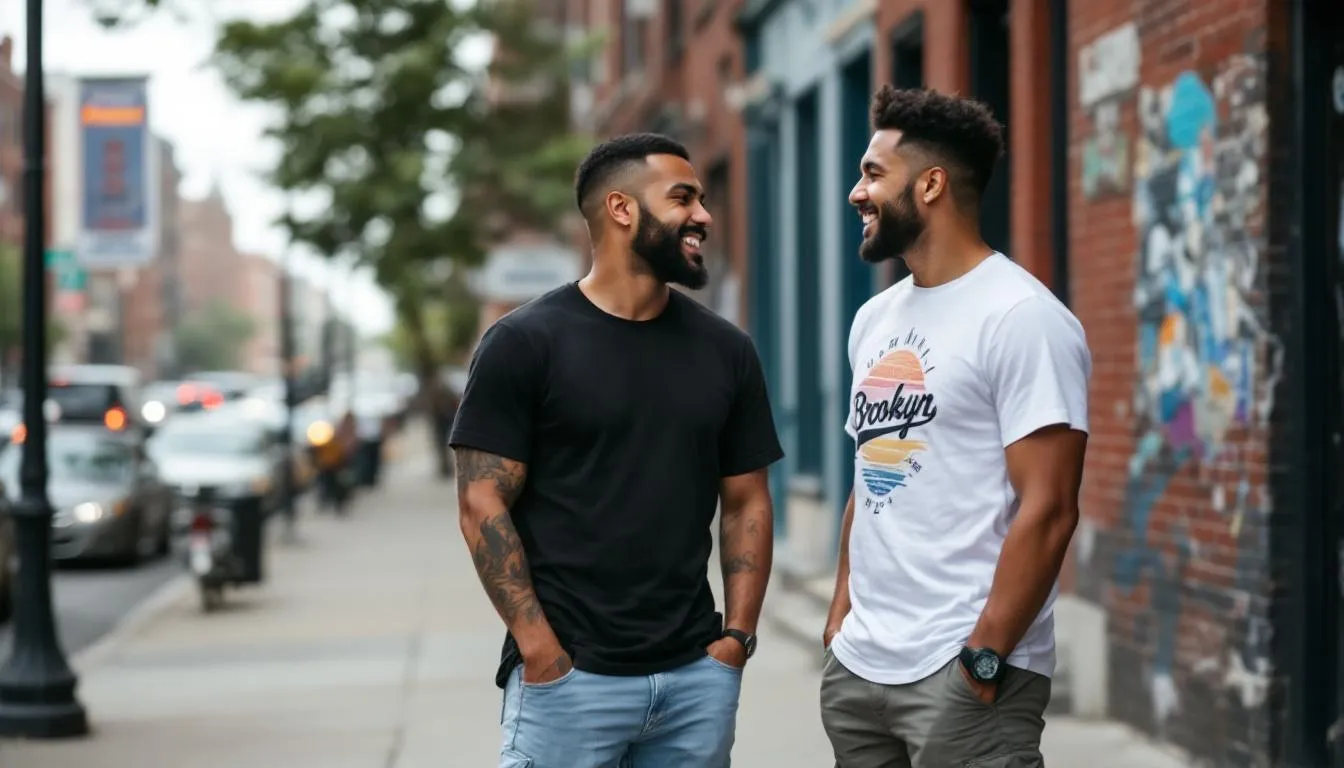
Build a Support Network Within the LGBTQ+ Community
The gay community in NYC offers incredible resources. However, you have to be intentional about connecting. This might mean joining organizations, attending community events, or simply making an effort to maintain friendships with other gay couples who understand your experience.
Research shows that same-sex couples with strong community support report higher relationship satisfaction and lower stress levels. Your community becomes your chosen family. Consequently, it provides the acceptance and understanding that biological family members might not offer.
Handle Family Acceptance Issues as a Team
Family dynamics present ongoing challenges for many gay couples. They can often trigger what Gottman’s research calls “perpetual problems” that can either strengthen or destroy relationships. You might have parents who are “accepting” but still ask uncomfortable questions about your friend in front of their neighbors. Alternatively, you may have family members who avoid mentioning your partner altogether. Some couples face more dramatic rejection or conditional love.
This is where EFT becomes invaluable. Instead of getting caught in what we call the “negative cycle” (where one partner pursues and the other withdraws), successful couples learn to recognize when family stress is triggering their attachment fears. Maybe your Abandonment schema gets activated when your partner’s family excludes you from holiday photos, sending you into Angry Protector mode, where you lash out defensively. Instead of attacking or withdrawing, EFT teaches you to share the vulnerable emotions underneath: “When your mom acts like I don’t exist, I feel scared that maybe I don’t matter to your family—or you.”
The strongest gay couples I work with approach family challenges through a united front. They discuss boundaries beforehand, support each other during complicated family interactions, and create traditions when family events become too stressful. This might mean spending holidays with a chosen family instead of a biological family in Queens. Furthermore, it could involve setting clear limits on what topics are acceptable for discussion.
Struggling with family dynamics? Schedule your confidential online session where you can explore these challenges in a safe, affirming space designed specifically for gay couples.
Establishing Healthy Relationship Boundaries and Expectations
Clear boundaries and expectations prevent misunderstandings and create security in gay relationships. Because there aren’t established cultural scripts for same-sex relationships the way there are for straight relationships, gay couples need to be more intentional about defining what their partnership looks like.
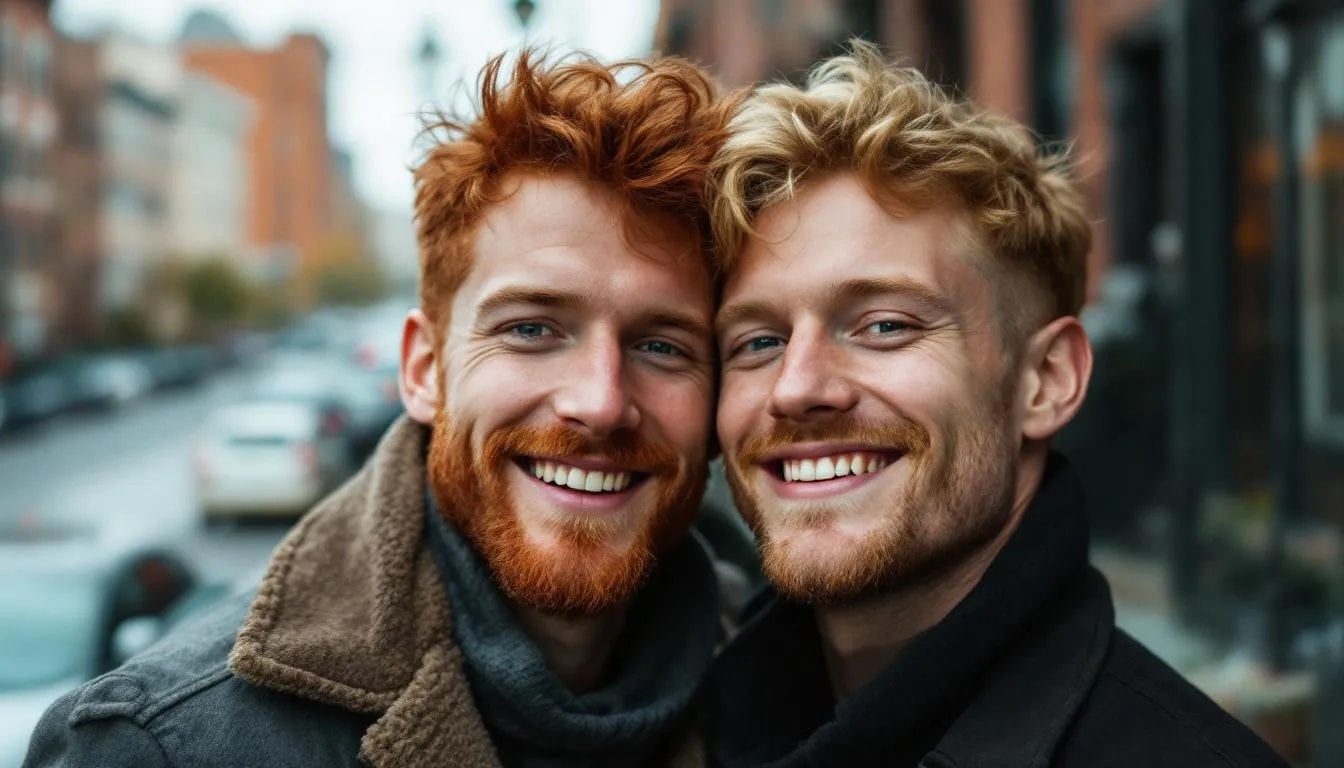
Define What “Relationship” Means to Both Partners
This conversation goes deeper than exclusivity. It’s about understanding each other’s vision for partnership. One person might envision marriage and children, while another might prefer a committed but less conventional structure. Neither approach is wrong. However, mismatched expectations create problems later.
The gay community offers more flexibility in relationship structures than heterosexual couples typically consider. Some couples thrive in traditional monogamous relationships. Meanwhile, others prefer open relationships with clearly defined boundaries. The key is honest discussion about what each person wants and needs.
Discuss Exclusivity Versus Open Relationship Preferences
Monogamy or open? In NYC, both are common. Both can be amazing. Or a total mess. The secret isn’t just how you talk about your agreements. It’s whether you live up to them. Do you both know what you want and why?
When you’re negotiating rules, it’s easy for old schemas to crash the party. Suddenly, you’re not just talking about boundaries. You’re wrestling with mistrust, effectiveness, abandonment, or feeling left out. These triggers can hijack the conversation before you even realize it.
The healthiest gay couples are curious, not combative. Ask yourself, “What’s the story behind this rule for me?” Maybe it’s about freedom, safety, or an old wound. If you notice yourself shutting down or getting defensive, pause. Is this about the agreement, or is an old fear flaring up?
Boundaries aren’t just about bodies. They cover feelings, time, and even what’s off-limits. Exes? Friends? That hot yoga instructor? Get specific. The happiest gay couples revisit their agreements often. Life changes, and so do feelings. Stop if one of you is saying test to keep the peace. That’s a recipe for resentment, not romance.
Monogamous couples need to pay attention. Research shows you can coast on autopilot and avoid thought talks. Open couples are forced to communicate more, but that doesn’t mean it’s easy. Commitments need honesty, flexibility, and regular check-ins. Relationships aren’t Instapots. You can’t just “set it and forget it.”

Set Clear Boundaries About Social Media and Dating Apps
Social media and dating apps create unique challenges for gay relationships. Grindr, Scruff, Instagram DMs–for many, they’re a part of the gay experience. Some couples delete them all. Others use them for friends or even a little window shopping.
Fights over apps are legendary. Is flirting okay? What about chatting with an ex? Do you want to know if your partner’s messaging someone new, or would that drive you up the wall? There’s no one-size-fits-all answer. The only rule? Talk about it, honestly. Set rules and make commitments that work for both of you.
But don’t forget that conversations about apps and boundaries often also trigger old schemas. Maybe your partner’s phone habits stir up your mistrust and abandonment schemas. Maybe you feel defective or excluded when your partner hooks up with that cute waiter. If you notice yourself spiraling, pause and check in. Is this about the app, or something deeper?
For open couples, digital boundaries matter as much as physical ones. Decide what you want to share and what stays private. For monogamous couples, get honest about what feels safe and what crosses the line.
The bottom line: the healthiest gay couples keep talking, honestly, with each other, even when they’re uncomfortable. They update their rules and commitments, check in regularly, and aren’t afraid to laugh at their awkwardness. They also stay mindful of the emotional baggage that can sneak into those conversations. If you’re lost, gay couples therapy is a safe place to figure it out together.
Agree on How to Handle Interactions with Ex-Partners
The gay community is often smaller and more interconnected than straight dating circles. Consequently, this means you’re likely to encounter ex-partners regularly. This is particularly true in neighborhoods like Chelsea or the West Village, where you might run into former dates at bars, the gym, or social events.
Discussing how to handle these interactions prevents awkwardness and jealousy. Some couples prefer minimal contact with exes. Meanwhile, others maintain friendships. Again, the specific approach matters less than having clear agreements that both partners feel good about.
Sexual Communication and Building Emotional Intimacy
Sexual communication in gay relationships requires navigating topics that straight couples might never discuss. Simultaneously, it involves building the emotional intimacy that sustains long-term partnerships. The quality of your sex life and your ability to talk about it openly directly impact your overall relationship satisfaction.
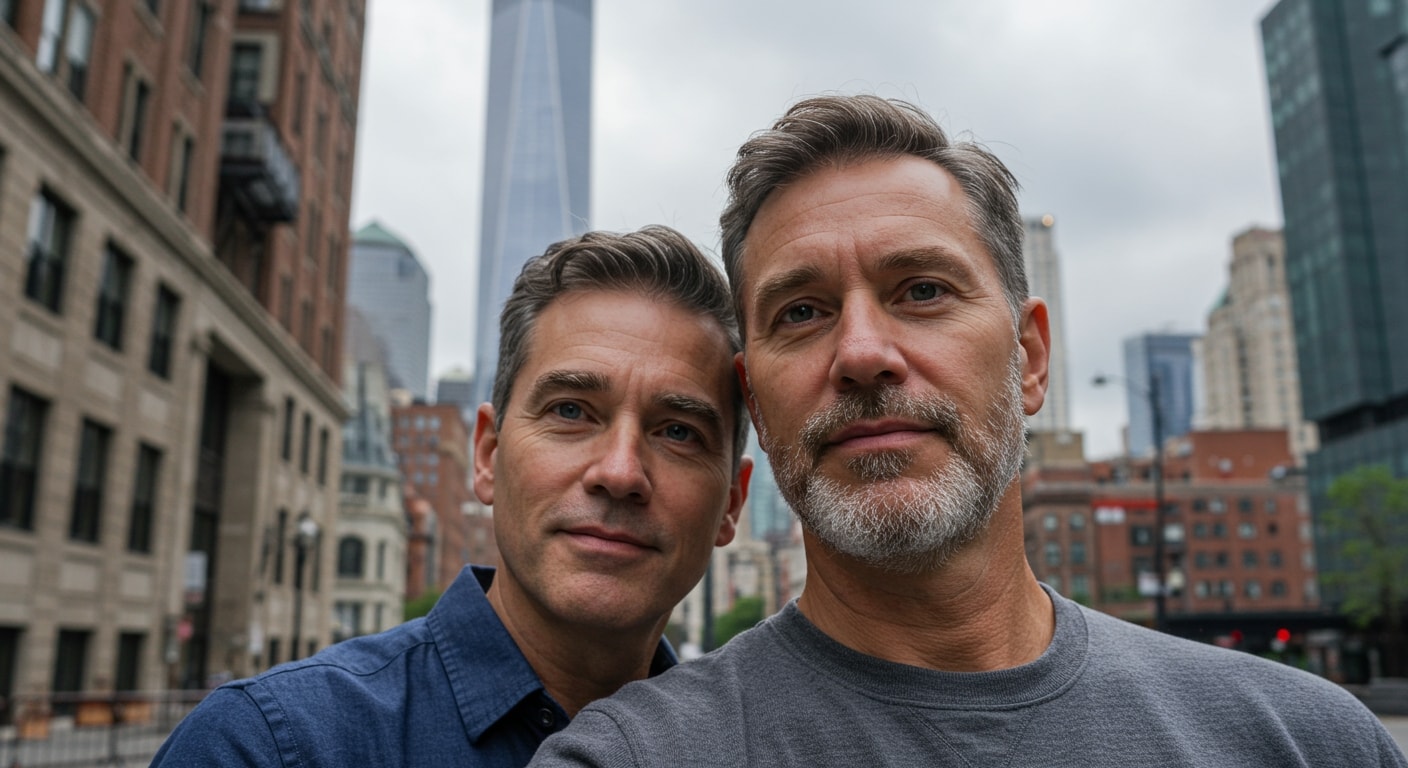
Be Transparent About Sexual Roles and Preferences
Gay men often face pressure to fit into top/bottom categories. However, sexual preferences are much more fluid and complex than these labels suggest. Honest conversations about what you enjoy, what you’re curious about, and what feels off-limits create the foundation for a satisfying sexual relationship.
These conversations should be ongoing rather than one-time discussions. Sexual desires and comfort levels evolve over time. Particularly, this happens as emotional intimacy deepens. The couples with the best sex lives are those who can talk openly about what’s working and what they’d like to explore.
Discuss Safe Sex Practices and Regular STI Testing
Regardless of your relationship structure, having explicit conversations about sexual health protects both partners and builds trust. This includes discussing testing schedules, comfort levels with different sexual activities, and what to do if someone gets exposed to an STI.
Many gay couples find that regular testing becomes part of their healthcare routine, whether they’re monogamous or not. Being proactive about sexual health demonstrates care for yourself, your partner, and any broader sexual network if you’re in an open relationship.
Maintain Physical Intimacy While Developing Emotional Connection
Sexual attraction might bring you together initially. However, lasting gay relationships balance physical chemistry with emotional intimacy. This means nurturing both aspects of your connection rather than assuming one will automatically lead to the other.
Physical intimacy includes sex. Additionally, it encompasses cuddling, casual touching, and other forms of physical affection. Many couples find that maintaining a non-sexual physical connection improves their sex life by creating overall intimacy and comfort.
Emotional intimacy often enhances physical attraction over time. Consequently, this creates what EFT calls a “positive cycle” where a deeper emotional connection leads to better sex, which strengthens the attachment bond. Building this requires intentional effort to share your inner world with your partner and create space for them to do the same. When schemas aren’t getting triggered and you’re both operating from your “Healthy Adult Mode,” intimacy flows naturally.
Need help navigating intimacy challenges? Online couples therapy provides a comfortable, private setting to explore these sensitive attachment needs and schema patterns with an LGBTQ+-affirming therapist who understands your unique experience.
Maintaining Individual Identity Within Your Partnership
One of the biggest mistakes couples make involves losing themselves in the relationship. This proves particularly challenging for gay men who may have spent years hiding or suppressing parts of their identity. Subsequently, they find themselves overwhelmed by the intensity of a romantic relationship where they can finally be completely themselves.

Preserve Personal Interests and Hobbies Outside the Relationship
Your individual interests and passions are part of what makes you attractive to your partner. Maintaining separate hobbies, interests, and activities keeps you interested in each other and prevents the relationship from becoming claustrophobic.
This might mean continuing with sports leagues, creative pursuits, or professional development that doesn’t involve your partner. Individual growth makes you a more interesting partner and gives you new experiences to share.
Maintain Friendships and Social Connections Independently
Gay male friends often provide irreplaceable support and understanding that even the most loving romantic partner can’t completely fulfill. These friendships offer different perspectives, shared experiences, and social connections that enrich one’s life and, by extension, enhance one’s romantic relationship.
Healthy couples encourage each other’s friendships rather than feeling threatened by them. This includes solo time with friends, separate social activities, and respect for existing friendships predating romantic relationships.
Take Solo Time and Space When Needed
Creating individual processing and reflection space requires intentional effort, especially in small NYC apartments. Some people need solo time to recharge, process emotions, or enjoy their company.
Requesting alone time doesn’t indicate relationship problems. Rather, it’s a sign of self-awareness and emotional maturity. Partners who support each other’s need for independence typically have stronger relationships because they choose to be together rather than staying together out of neediness or fear.
Here’s where understanding your protective modes becomes crucial: If you grew up using Avoidant Protector mode to cope with rejection or criticism, you might automatically retreat when stressed, even when your partner is trying to support you. Learning to distinguish between healthy alone time and schema-driven avoidance can transform your relationship dynamics.
Building Long-Term Relationship Success
Creating a lasting relationship requires more than compatibility. It demands ongoing effort, intentional connection, and a commitment to growing together over time. Gay couples who build lasting partnerships understand that love is both a feeling and a practice.
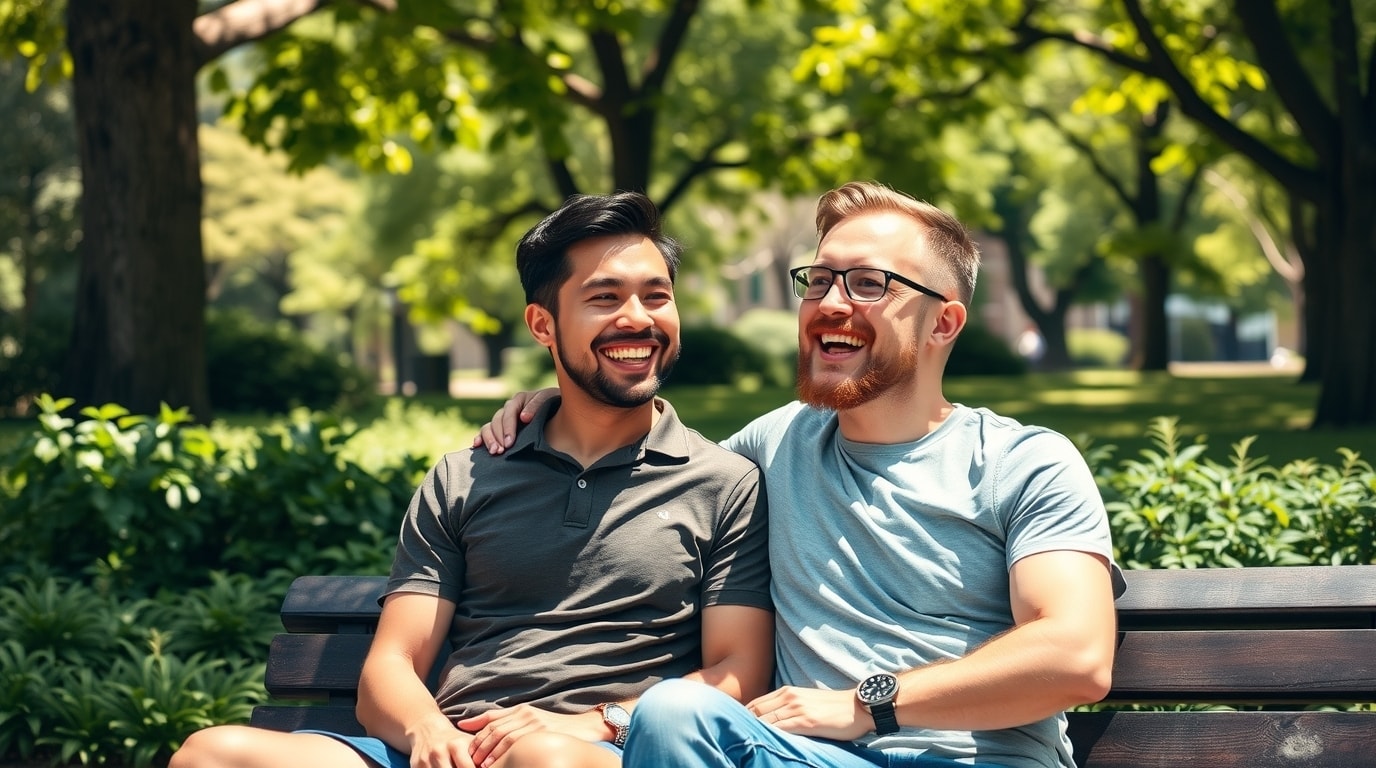
Schedule Regular Quality Time Together Without Distractions
In a city like NYC, where everyone is constantly busy and overstimulated, carving out uninterrupted time together becomes a radical act of prioritizing your relationship. This means keeping phones away, closing laptops, and focusing genuine attention on each other.
Quality time doesn’t have to be elaborate or expensive. It might be morning coffee together before the day gets chaotic. Alternatively, it could involve evening walks through Prospect Park. Similarly, it might simply mean sitting together and talking about your days. The key is consistency and presence rather than grand gestures.
Make Daily Efforts to Show Appreciation and Love
Long-term relationship success builds through small, consistent actions rather than occasional big romantic moments. This includes expressing gratitude for everyday contributions, acknowledging your partner’s efforts, and looking for opportunities to show care and affection.
Appreciation can be verbal: “I noticed you picked up groceries without being asked. Thank you.” You can also show it physically with spontaneous hugs or affectionate touches. Or, make it practical by handling tasks your partner dislikes. The goal is to create an atmosphere where both partners feel valued and cherished daily.
Support Each Other’s Goals and Dreams
Strong partnerships involve two individuals who commit to each other’s success and fulfillment. This means actively encouraging your partner’s career aspirations, personal goals, and dreams, even when you require sacrifice or adjustment.
Supporting your partner might involve celebrating their achievements, brainstorming solutions to their challenges, or making practical accommodations to help them pursue their goals. When both partners feel supported in their individual growth, the relationship becomes a launching pad for personal success rather than a limitation.
Practice Forgiveness and Let Go of Past Grievances
All relationships involve hurt feelings, misunderstandings, and mistakes. The couples who last develop the ability to repair damage, forgive genuinely, and move forward without carrying grudges.
Forgiveness doesn’t mean accepting harmful behavior or pretending problems don’t exist. Instead, it means addressing issues directly, working toward resolution, and choosing not to weaponize past mistakes in future conflicts. Learning healthy conflict resolution requires maturity, communication skills, and sometimes professional support.
Here’s where understanding schemas becomes incredibly powerful: our most significant relationship wounds often happen when our partner inadvertently triggers one of our core schemas. Maybe your partner’s Social Isolation schema gets triggered when you want to spend time with friends, so he gets clingy and demanding. Instead of taking it personally, you can recognize the schema activation and respond with compassion: “I can see you’re feeling scared that I might leave you out or abandon you. That’s not my intention at all.”
Consider Couples Therapy for Ongoing Relationship Maintenance
Many successful couples view therapy as preventive care rather than crisis intervention. Regular check-ins with a skilled therapist can help you identify and address minor issues before they become significant problems.
Therapy provides tools for better communication, deeper intimacy, and navigating life transitions together. It’s particularly valuable for gay couples who may not have many models of successful same-sex relationships to learn from. Working with a therapist who understands gay relationship dynamics—and who’s trained in approaches like EFT and Schema Therapy—can accelerate your growth as a couple.
Think of it this way: you wouldn’t skip regular maintenance on your car and expect it to run perfectly forever. Your relationship deserves the same kind of proactive care. Plus, there’s something oddly satisfying about learning you have a “Perfectionist” schema instead of just thinking you’re “impossible to please.” It’s like getting a fancy diagnosis for your relationship quirks.

Meet Your NYC Gay Couples Therapy Team: Experts Who Understand Your Journey
At this point, you might be wondering, “This all sounds great, but who exactly would I be working with?” Here’s the thing—finding the right therapist for gay couples therapy isn’t just about credentials (though those matter). It’s about working with someone who truly understands the unique landscape of gay relationships and has dedicated their career to helping LGBTQ+ couples thrive.
Travis Atkinson, LCSW, LICSW: Founder & Director
With nearly three decades of experience, Travis Atkinson founded Loving at Your Best. He’s not just certified in the Gottman Method, Emotionally Focused Therapy (EFT), and Schema Therapy—he’s co-created groundbreaking training programs specifically for same-sex couples. Travis’s approach is profoundly shaped by his international work and multicultural perspective, allowing him to see each couple’s relationship as a unique cultural entity.
One area that sets Travis apart is his deep understanding of how those Domain 1 schemas play out, specifically in gay relationships. When your Abandonment schema gets triggered because your partner’s family still “forgets” to invite you to gatherings, Travis gets it. When your Avoidant Protector mode kicks in during Pride season because crowds feel overwhelming, he understands the complexity behind that response.
“Every couple’s journey is unique,” Travis explains. “I’ve learned that’s especially true when building something together that you didn’t see modeled growing up. My role isn’t to dust off some heteronormative relationship template and hope it fits. It’s to honor your story, whether you met on Grindr or at a Pride party in Prospect Park. Maybe you’re navigating coming out to family at 35. Or figuring out how to merge two fully-formed adult lives without losing yourself. Either way, I’m here to guide you towards the connection you seek.”
This isn’t just therapeutic speak. It’s recognition that your relationship exists within multiple contexts. As a gay couple creating your blueprint for partnership, New Yorkers who know that real intimacy sometimes means having serious conversations while dodging tourists in your neighborhood, and as individuals with your schema patterns and protective modes. Those are the ways you learned to protect yourself that maybe don’t serve your relationship anymore.
Paul Chiariello, LMSW, MSc Ed: Couples & Individual Therapist
Paul brings a unique blend of clinical expertise and lived experience to his work with gay couples in Manhattan and Brooklyn. His diverse background spans conflict resolution, education, and clinical social work, making him particularly skilled at helping partners navigate the complex intersection of personal identity and relationship dynamics.
What clients love about Paul is his ability to help partners recognize when they’re operating from old protective modes that no longer serve them. Maybe your Detached Protector helped you survive a hostile family environment, but now it’s keeping you from sharing your fears about career changes with your partner. Paul specializes in helping couples transition from survival to thriving mode.
Paul’s approach is grounded in unconditional positive regard, mindfulness, cognitive and dialectical behavior therapies, and schema therapy. He’s passionate about helping clients explore and become their best selves while addressing the unique challenges gay men face—from identity formation to navigating depression, anxiety, and existential crises that often accompany coming out and building authentic relationships.
Here’s something unique about Paul: He masterfully runs three men’s groups (for all sexual orientations)—two on Tuesday evenings and one on Wednesday evenings. These groups can be a fantastic supplement to gay couples therapy, especially for partners struggling with those Domain 1 schemas around social exclusion and isolation. Sometimes, individual work in a supportive group setting helps you process your own schema patterns before bringing that insight back to your relationship. It’s like having a practice space for vulnerability before the main event.
Jon Prezant, LMSW: Couples & Sex Therapist
Jon Prezant brings a specialized focus that many gay couples desperately need but struggle to find: someone who truly understands both relationship dynamics and sexual health within LGBTQIA+ partnerships. As a licensed master social worker, Jon’s approach is rooted in sex therapy, trauma-informed care, and emotionally focused therapy.
Here’s what makes Jon invaluable for gay couples: he understands how schema patterns specifically impact sexual intimacy. When your Defectiveness schema gets triggered, it doesn’t just affect your emotional connection—it can completely derail your sex life. Jon specializes in working with LGBTQIA+ individuals and couples, poly relationships, and those navigating sexual functioning, desire, and self-esteem issues that often intersect with deeper schema work.
Jon integrates Schema Therapy, CBT, and Solution-Focused Therapy while actively pursuing certifications in Sex Therapy and EFT. This combination means he can help you address both the emotional patterns that create distance and the specific sexual challenges that many gay couples face, but rarely know how to discuss.
Exciting news: Jon is forming a brand-new group specifically for gay men on Thursday evenings. This could be perfect if you’re dealing with schema patterns around sexual identity, body image, or relationship anxiety that might benefit from group support alongside couples work. Contact us for a free consultation with Jon to find out if his new gay men’s group might be a great fit for you—sometimes processing these issues with other gay men who truly get it can accelerate your individual growth and, by extension, strengthen your relationship.
Tiffany Goldberg, LMSW: Couples & Family Therapist
Tiffany Goldberg brings a Columbia-trained perspective and real-world experience that’s particularly valuable for gay couples navigating complex family systems. Her career began with counseling at-risk youth and trauma survivors, including World Trade Center survivors and women at Rikers Island—experiences that taught her how resilience develops in the face of systemic challenges.
For gay couples, Tiffany’s understanding of trauma and family systems is crucial. She understands that growing up in environments where your identity wasn’t accepted creates specific patterns in adult relationships. Her strengths-based, compassionate approach helps clients identify and transform unhelpful thoughts, emotions, and behaviors while honoring the survival strategies that got them through difficult times.
Tiffany’s extensive experience in substance use treatment and family systems makes her particularly skilled at helping couples where addiction or family-of-origin issues complicate the relationship dynamic. She understands how schema patterns often manifest through addictive behaviors or family loyalty conflicts that can tear gay couples apart.
Both Travis and the whole team understand that gay couples therapy isn’t just regular couples therapy with rainbow flags in the office. It’s a therapy that acknowledges the unique ways that social exclusion, family rejection, and internalized homophobia create specific schema patterns that show up in your relationship. We celebrate your courage in choosing love while giving you practical tools to build the lasting connection you deserve.
Want to explore additional support? Whether it’s Paul’s men’s groups for processing individual schema work, Jon’s new gay men’s group for identity and relationship issues, or comprehensive couples therapy with any of our specialists, we offer multiple pathways to healing and growth. Sometimes the combination of individual group work and couples therapy creates the most powerful transformation.
Legal and Practical Considerations for Gay Couples
Marriage equality has created new opportunities and responsibilities for same-sex couples. However, navigating a partnership’s legal and financial aspects requires careful planning and ongoing communication.
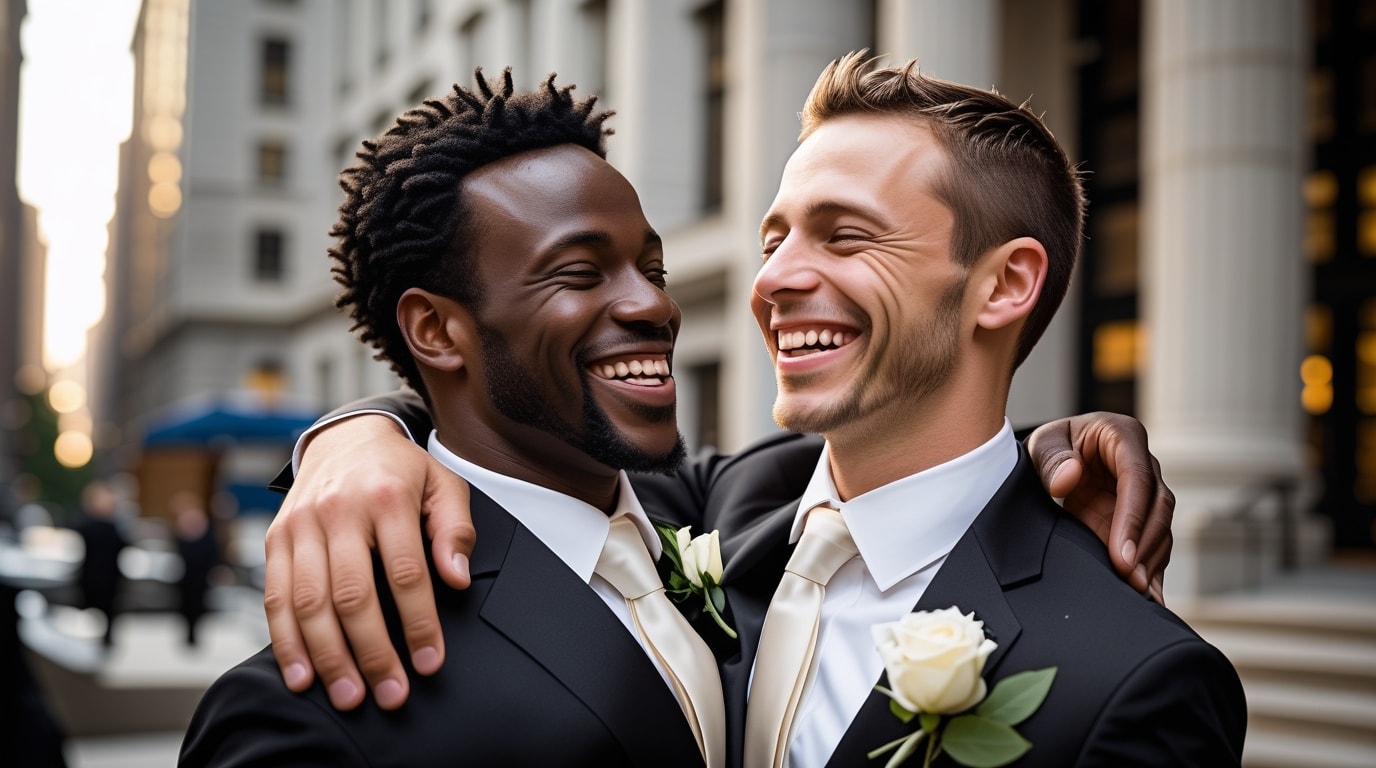
Research Local Marriage Equality Laws and Rights
While marriage equality is the law nationwide, there are still variations in how states and municipalities handle issues like adoption, healthcare decisions, and spousal benefits. Understanding your rights and protections helps you make informed decisions about marriage, domestic partnerships, and other legal arrangements.
New York State has strong protections for same-sex couples. However, if you travel frequently or have family in other states, understanding the legal landscape becomes more complex. Staying informed about your rights helps you advocate for yourself and plan for various scenarios.

Establish Legal Protections, Like Power of Attorney, If Needed
Even married couples benefit from having clear legal documentation about healthcare decisions, financial management, and end-of-life preferences. This proves particularly important for gay couples who may face resistance from family members who don’t recognize or respect their relationship.
Legal protections might include healthcare proxies, power of attorney documents, wills, and beneficiary designations on financial accounts. While these conversations aren’t romantic, they demonstrate commitment and protect both partners in emergencies.
Discuss Financial Planning and Shared Responsibilities
Money conversations are crucial for all couples. However, they’re vital for same-sex couples who may not have traditional models for handling finances together. This includes decisions about shared expenses, individual spending, savings goals, and long-term financial planning.
Many couples find it helpful to discuss their financial values and goals early in the relationship. Subsequently, they revisit these conversations regularly as circumstances change. Being clear about financial expectations prevents resentment and supports shared decision-making about major purchases and life changes.
Red Flags to Avoid in Gay Relationships
Recognizing warning signs early can prevent you from investing time and energy in unhealthy or unsustainable relationships. While every relationship has challenges, specific patterns indicate fundamental incompatibilities or harmful dynamics unlikely to improve over time.

Recognize Signs of Emotional Manipulation or Control
Healthy relationships build on mutual respect and shared decision-making, not on one partner controlling or manipulating the other. Red flags include attempts to isolate you from friends and family. You might also notice excessive monitoring of your activities or communications. Or, your partner may use emotional manipulation to get their way.
Pay attention to how conflicts get resolved in your relationship. Healthy partners work toward mutually acceptable solutions. Meanwhile, controlling partners use guilt, threats, or manipulation to force compliance with their preferences.
From a schema perspective, partners with controlling behavior often operate from their triggered schemas, like Mistrust/Abuse or Entitlement. While understanding the “why” behind the behavior can create compassion, it never excuses harmful treatment. If your partner consistently operates from what we call “Angry Demanding Mode” and refuses to work on it, that’s a deal-breaker, regardless of their childhood wounds.
Avoid Partners Who Aren’t Comfortable With Their Sexuality
While everyone’s coming-out process is different, entering a serious relationship with someone who hasn’t achieved basic comfort with their sexual orientation creates inevitable problems. This might manifest as reluctance to be seen together publicly. Additionally, it could involve discomfort with LGBTQ+ community events. Furthermore, it might include shame about the relationship.
You can’t fix someone else’s internalized homophobia or accelerate their coming-out process. While compassion is essential, trying to build a healthy relationship with someone who isn’t comfortable with their own sexuality typically leads to frustration and heartbreak for both partners.
Don’t Tolerate Disrespect, Criticism, or Verbal Abuse
Healthy relationships involve occasional conflict and disagreement. However, they never include personal attacks, name-calling, or deliberately hurtful behavior. If your partner regularly criticizes your appearance, intelligence, or choices or uses hurtful language during arguments, these are serious red flags.
Verbal abuse often escalates over time. Moreover, it’s never acceptable regardless of stress, alcohol use, or other circumstances. The relationship has become unhealthy if you walk on eggshells to avoid your partner’s anger or criticism.
Watch for Excessive Jealousy or Possessive Behavior
Some jealousy is normal in relationships, especially when you’re still building trust and security. However, excessive jealousy that leads to accusations, monitoring, or attempts to control your behavior indicates deeper problems.
Healthy partners trust each other to maintain appropriate boundaries with friends, coworkers, and others. If your partner regularly accuses you of inappropriate behavior without evidence, demands constant reassurance about your commitment, or tries to limit your social interactions, these are warning signs of possessiveness.
When Core Values Clash: Why Assessment and Hope Come First
Opposites can attract. What about that pineapple on your pizza? Some love it, some don’t. Opposites can create vibrant, dynamic relationships. Still, some disagreements can feel impossible to bridge. Examples for some gay couples might include whether to have children, how to handle money, or what “success” to both of you means.
What’s the reality? Most couples come to therapy thinking their differences are set in stone. Research in Schema Therapy, EFT, and the Gottman Method shows that even “core” value conflicts are often rooted in deeper patterns, old wounds, and unmet needs. With the proper process, many couples discover new flexibility, empathy, and creative solutions they never imagined.
That’s why at Loving at Your Best, we never ask you to decide your future based only on how things have been. We start with the most thorough assessment available. We help you and your partner see what’s driving your positions, what’s possible, and what you both truly want for your future.
You’ll get a clear, honest picture of your relationship’s potential. With our expert therapist, we set clear, achievable goals and a realistic timeframe for you and your partner to work toward them. We don’t ask you to decide based on the past, but on the future you want.
Usually, couples find new ways to honor both partners’ needs and values. In some cases, one or both partners may decide that their visions for the future don’t align. We help both partners make these crucial decisions with as much clarity as possible.
Either way, you and your partner can decide with deep understanding, not confusion or resignation. You’ll know yourself and your partner better than ever. And you’ll have done everything possible to see what’s truly possible for a satisfying and enduring relationship.
Bottom line: Don’t assume a core value clash is a dead end. Sometimes, it’s just a plot twist. With our expert assessment and the proper support, many couples find hope and new options. In those rare cases when parting is the healthiest choice, you’ll do it with mutual respect and a clear heart.
Your Next Step: Working With a Gay Couples Therapist Who Gets It
Building a lasting gay relationship in Manhattan or Brooklyn requires intention, effort, and a willingness to navigate challenges that straight couples may never face. However, when you find the right person and do the relationship work together, the rewards can be extraordinary. You’re not just building a romantic partnership. You and your partner are creating a foundation for a life lived authentically and fully. You can surround yourselves with love that celebrates exactly who you are.

The journey isn’t always easy. Nevertheless, it can always be worth it. Whether you’re just starting to date or you’ve been together for years, every happy gay couple was once two individuals who decided to choose love, growth, and commitment over fear. Find out if your relationship has the potential to be not just surviving but truly thriving in one of the world’s greatest cities.
Ready to thrive and not just survive? My Loving at Your Best Plan integrates nearly three decades of experience with gay couples. Additionally, my experience includes pioneering work with the late Sue Johnson, the founder of Emotionally Focused Therapy, where we developed the first training video for couples therapists using EFT for same-sex relationships. I was fortunate to do groundbreaking work with Schema Therapy’s founder, developing the Schema Therapy for Couples model together in the late 90s. Now it is time for you and your partner to build on these developments and build the love story you deserve.
Schedule Your Confidential Online Consultation Today and start your journey toward the relationship you’ve always wanted. Because love this authentic deserves professional support that truly gets it, and understands how your schemas, attachment patterns, and coping modes affect your capacity for lasting connection.

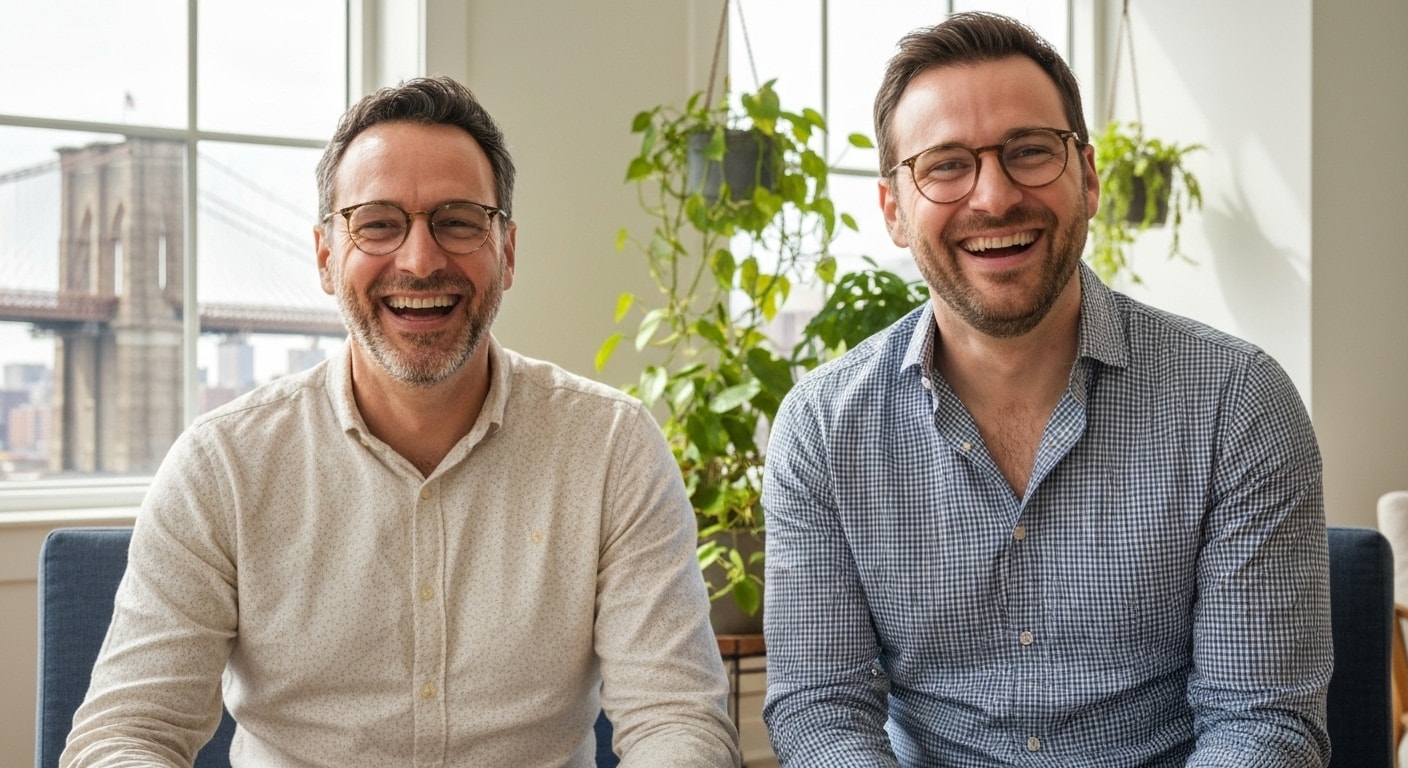
FAQ: Your Most Pressing Questions About Gay Relationships in NYC
What drives attraction? Why does the spark fade without a real connection?
Attraction is complex and multi-layered. Science shows it’s never just one thing.
Pheromones play a role.
You can’t see them, but your body sends chemical signals every time you sweat. Sometimes, pheromones boost desire and confidence. They can even make someone seem irresistible. Some studies show a 40 percent jump in sexual response when pheromones are in play. Not everyone’s nose is tuned the same way, though. For some, it’s a non-event.
Emotional chemistry is next.
Your brain gets a hit of dopamine, serotonin, and norepinephrine. Suddenly, you feel that “can’t-eat, can’t-sleep” rush. It’s the same brain circuit as a sugar high. This rush explains the excitement of early dates.
Don’t forget schema chemistry.
Ever wonder why you keep falling for the same “type,” even if it’s a disaster every time? That’s schema chemistry at work. Your brain is drawn to people who activate your deepest schemas. It’s not always good for you, but it feels familiar—even if it hurts. This is why you might keep dating the same “type,” even when you swear you want something different.
Genetic and physical factors matter, too.
Your hormones, immune system, and even your genes play a role. Sometimes, your body picks up on genetic differences or similarities you can’t consciously detect.
Behavioral synchrony and responsiveness are huge.
Chemistry builds through repeated, responsive interactions. When your partner “gets” you, laughs at your jokes, or matches your energy, your brain starts to see them as special.
So, why does the spark fade so fast without an emotional connection?
Research shows pure sexual attraction, without emotional intimacy, can start to fade in as little as three hours. The effect on desire drops off sharply after that. It’s gone after a few hours if there’s no deeper bond. The “honeymoon period” of intense desire usually lasts one to two years. Passion fizzles out even faster if you don’t build a real emotional connection.
True, lasting attraction goes beyond physical traits or charm. It’s about emotional connection. Build trust, vulnerability, and genuine understanding if you want lasting chemistry. Otherwise, you’re chasing a spark that burns out before the night ends.
This matters because you can stop blaming yourself for “losing the spark.” You can start building something real. Attraction is wild, but you can make it last with the proper support.
Ready to turn chemistry into connection? Book your session now, and let’s help you build a love story that doesn’t fizzle out.
Is online therapy as effective as in-person meetings, especially for relationship issues?
Absolutely. The research is clear: online couples therapy works. For gay couples in NYC, it can be even better.
You get the same results as in-person therapy but with more comfort, privacy, and zero subway drama. Studies show that EFT and the Gottman Method translate perfectly to video. You’re in your own space, so shame triggers fade, and real talk flows.
High conflict? Online therapy can help you regulate your emotions better. No audience, no pressure. Just you, your partner, and your therapist.
Safety concerns or violence? That’s a different story. Those situations need specialized support, not couples therapy.
Ready to experience therapy on your terms? Our team delivers world-class care straight to your living room.
We keep having the same fight over and over. Are we just incompatible?
Nope. You’re stuck in a negative cycle that can be fixed.
EFT calls it the “anxious-avoidant dance.” Schema Therapy calls it “old wounds running the show.” Gottman calls it “perpetual problems.” We call it a chance to break free, finally!
How We Break the Cycle: For Real
Let’s call out the truth. You’re done with reruns. So are we.
Here’s what we do differently:
– Map your mode cycles.
We help you spot the patterns. Not just “triggers.” We’re talking about those old wounds, like Abandonment or Emotional Deprivation, that hijack your arguments. Suddenly, one of you turns into the Ice Queen. The other becomes the Prosecutor. This is not about blame. It’s about seeing what’s running the show.
– Identify and invite your needs.
No more hinting. No more silent treatments. We’ll teach you to tune in and speak up. Want reassurance? Say it. Need closeness? Ask for it. When your Abandonment alarm blares, you’ll know how to say, “I need to know you’re here.” Fights turn into connections. Sometimes, you even surprise yourself.
– Connect with ARE conversations.
Are you Accessible? Will you answer when your partner reaches out?
Are you Responsive? Will you turn toward him, not away?
Are you Engaged? Even when you’re both a mess, do you still matter to each other?
These are not just therapy buzzwords. They are your new relationship toolkit. Suddenly, “I need you” is not risky. It is real.
You start to see the pattern. You both catch yourselves. Maybe you even laugh. You remember you are on the same team. This is how relationships go from stuck to strong.
Ready to stop the reruns and start something new? Book your online session now. Let’s turn old fights into real connections right from your couch.
How do we navigate different comfort levels when we are out without destroying our relationship?
Your coming-out story is yours. Your partner’s is theirs. We help you honor both.
Maybe you’re ready to hold hands on the High Line, but he’s not. That’s not a dealbreaker. It’s an invitation to deeper understanding. We use EFT, Schema Therapy, and the Gottman Method to help you feel seen, safe, and respected.
No more “all or nothing.” We’ll help you build a bridge, not a battleground.
How do we keep the passion alive when NYC is full of distractions?
Passion isn’t luck. It’s built. And yes, you can get it back.
Research shows gay couples who thrive in NYC use humor, affection, and real talk—even during fights. Our Loving at Your Best Plan gives you the tools to keep desire alive, even after a decade together.
Reignite attraction with new rituals. Use Mindsight to catch passion-killers. Build emotional safety so physical intimacy follows.
Don’t settle for “roommates with benefits.” Let’s bring the spark back.
How do we handle family acceptance issues without letting them poison our relationship?
Family drama is real, but doesn’t have to run your love life.
We’ll help you set boundaries, heal old wounds, and stay united. Schema Therapy, EFT, and Gottman’s “Dreams Within Conflict” turn family stress into a source of strength, not sabotage.
You can choose your family and how you show up for each other.
What if we want different relationship structures? Is this a dealbreaker?
Not at all. It’s a conversation, not a crisis.
We help you uncover what’s behind your preferences—attachment needs, old wounds, and dreams for the future. Our plan gives you a safe space to experiment, negotiate, and find what works for both of you.
No judgment. Just clarity, honesty, and real options.
How do I know if my relationship is worth fighting for or if we’re trauma-bonding?
If you’re asking, you care. That’s the first sign you’re likely not doomed.
We use Schema Therapy, EFT, and Gottman tools to help you distinguish between healthy struggles and toxic cycles. There’s hope if you and your partner are willing to do the work.
Let’s get you clarity—and a path forward.

Is online therapy flexible enough for our NYC lifestyle? Who’s not a fit?
Online therapy is made for New Yorkers.
Book sessions around your schedule—morning, night, or weekend. There is no commute, and there are no awkward waiting rooms. You can enjoy privacy and comfort wherever you are.
Who’s not a fit?
Couples who can’t find a private space or lack reliable tech access. If you’re worried about being overheard or interrupted, or your Wi-Fi drops every five minutes, online therapy probably isn’t going to work well.
Couples with safety concerns—like fear, violence, or coercion—need specialized support, not couples therapy. That’s true for both online and in-person work. The same goes for couples where one or both partners are actively having an affair or struggling with untreated substance abuse. These situations need a different kind of help first.
For everyone else, online therapy is a game-changer. You get flexibility, privacy, and expert support from your safe space.
What if one of us is struggling with substance use? Can couples therapy help?
Absolutely. Couples with substance use concerns often face complex challenges, but there is real hope for healing together.
Research shows that Behavioral Couples Therapy (BCT)—a form of couples therapy grounded in cognitive-behavioral principles—is one of the most effective treatments for substance use disorders when combined with individual treatment. BCT focuses on improving communication, increasing positive interactions, and building support for abstinence within the relationship.
Studies demonstrate that couples who engage in BCT after the partner with substance use issues have started appropriate treatment (like detox or outpatient care) experience:
Greater abstinence rates
Improved relationship satisfaction
Reduced relapse and fewer substance-related problems
Lower rates of separation and divorce
Our Loving at Your Best Plan integrates CBT techniques with Schema Therapy, EFT, and the Gottman Method to provide a comprehensive, LGBTQ+-affirming approach. This plan is ideal once the partner needing substance abuse treatment is engaged in a treatment protocol. We help couples rebuild trust, improve communication, and create a foundation for lasting recovery and relationship health.
In short: Addressing substance use first is critical. Then, couples therapy, especially approaches like ours at the Loving at Your Best Plan that combine CBT and BCT principles, becomes the most powerful tool for healing both addiction and your relationship.
Any rapid-fire tips for dating, overcoming gay relationship challenges, and communicating like a pro?
Absolutely. Here’s your NYC cheat sheet:
Dating as a gay man? Attraction is unpredictable. You can’t control who gives you butterflies, but you can spot your patterns. Compatibility is finding someone whose weird matches yours—and whose values fit your future. Stay curious. Don’t settle for drama just because it feels familiar.
Is internalized homophobia still messing with your confidence?
You’re not alone. We’ve discussed how therapy and community support help you unlearn shame and rewrite your story. Here’s the secret: The more you surround yourself with affirming people, the faster you believe you belong.
Want to master communication?
It’s a skill, not magic. Start small: share a feeling, ask an open-ended question, or say, “I appreciate you.” Practice, patience, and a little humor go a long way. The best couples aren’t mind readers—they’re brave enough to talk.
The bottom line: You can’t control attraction, but you can choose how you show up. You can’t erase the past, but you can build a future that feels like home.
Struggling with internalized homophobia, shame, or feeling “not gay enough” (or “too much”)?
You’re not alone. Even in Manhattan or Brooklyn, those old messages sneak in. Here’s the good news: Therapy and community support are the most potent tools for unlearning shame. Research shows that gay men who build a chosen family, join affirming groups, or work with a therapist who truly gets it rewire their brains for more pride and less fear. Want to feel more at home in your skin? Start by surrounding yourself with people who see the real you and cheer you on.
Want to communicate like a legend, not a sitcom character?
Communication is a skill, not a talent. No one is born knowing how to talk about feelings, especially not men raised on “don’t ask, don’t tell.” The secret? Practice. Start with micro-moments: “I appreciate you,” “I’m nervous about this,” or even “I need a hug.” Use open-ended questions—ditch “Did you have a good day?” for “What made you smile today?” And when things get heated, slow down. Breathe. Reflect on what you heard, even if you disagree. Over time, your conversations go from surface-level to soul-level.
Bottom line: You can’t control attraction, but you can choose how you show up. You can’t erase the past, but you can rewrite your story with the proper support. And you can learn to connect, even if you’ve never seen it done before.
Ready for more than just advice? Book your session now, and let’s make your love life as bold as this city’s.
Why choose Loving at Your Best for online gay couples therapy in NYC?
Because we get you and have the science to back it up.
We are the only NYC team offering the Loving at Your Best Plan: Schema Therapy, EFT, Gottman Method, Mindsight, and CBT. All are tailored for LGBTQ+ couples, all online, and all with expert, affirming therapists.
No more one-size-fits-all. You don’t have to feel misunderstood for who you are. You get real change, real connection, and real results.
Ready to build the love story NYC will envy?
Book your confidential online session now, and let’s get started.















